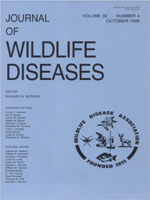Sera from 150 eastern barred bandicoots (Perameles gunnii) were collected from two study sites in southern Tasmania between 1992 and 1995. Samples were tested for antibodies to the protozoan parasite, Toxoplasma gondii, using formalin-treated tachyzoites as the antigen in direct (DAT) and modified agglutination tests (MAT). Cut-off titers were set based on confirmed cases of toxoplasmosis in this species. A total of 133 animals (89%) were classified as negative, seven (4.6%) had suspicious reactions, and 10 (6.7%) were diagnosed as positive. Five of the 10 positive animals were not retrapped after initial seroconversion; another three animals recorded high MAT titers on two consecutive bleedings, three months apart. Of the remaining two seropositive bandicoots, one was found dead in a trap and generalized toxoplasmosis was diagnosed at necropsy, while the other animal had central nervous system disabilities consistent with toxoplasmosis but was accidently released and never recaptured. Based on these findings we propose that eastern barred bandicoots are likely to be highly susceptible to primary T. gondii infection.
How to translate text using browser tools
1 October 1996
DETECTION OF AGGLUTINATING ANTIBODIES TO TOXOPLASMA GONDII IN SERA FROM FREE-RANGING EASTERN BARRED BANDICOOTS (PERAMELES GUNNII).
David L Obendorf,
Pat Statham,
Mike Driessen

Journal of Wildlife Diseases
Vol. 32 • No. 4
October 1996
Vol. 32 • No. 4
October 1996
agglutination test
antibody
eastern barred bandicoot
Perameles gunnii
serologic survey
Toxoplasma gondii




